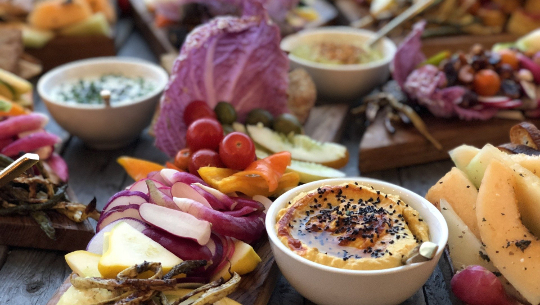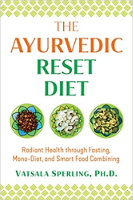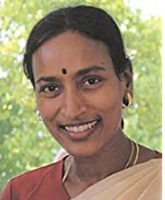
Image by AquaSpiritLens
Narrated by Marie T. Russell
Video version at the end of this article
When I was growing up in Jamshedpur, India, we lived a life based on Ayurveda, an ancient system for understanding disease and health that considers food that is grown, cooked, and eaten with reverence as both nutrition and medicine.
Our parents taught us to talk to the plants that grew year-round in abundance in our front and back kitchen gardens as well as on our rooftop and ask for the plants’ forgiveness before cutting, plucking, pruning, or necessarily uprooting them. We were trained to thank the plants for providing us with fruits, vegetables, and flowers and to take only as much as we needed at any given time; thus harvesting was a daily process.
My mother was also a great storyteller, and most of her mealtime stories revolved around concepts like thankfulness, expressing gratitude toward nature and the gods whose grace keeps us in good, physical, mental, and emotional health, and partaking of and enjoying food and benefitting from its life-nurturing qualities. We also saw our parents fast on all religious occasions and for several days every month and donate their share of food to needy people.
Get The Latest By Email
Milestones in Science vs. Individual Attitudes
Since my childhood in the 1960s, science has reached great milestones by discovering more and more information about food, including its farming, harvesting, storage, transportation, and biochemical nature. Scientists can predict how many calories and how many grams of any particular nutrient consumed might result in greater longevity or a certain amount of muscle mass or bone density and perhaps even predict the perfect diet that would result in that elusive goal: immortality.
But this wealth of information on every material aspect of food seems to have stripped off the reverential, devotional, prayerful, and thankful attitude toward food and ignores the manner in which it is prepared and eaten. It seems that food is seen as a commodity to be consumed daily, and it is often thought to be more of a curse than a blessing.
Seeing my parents remain youthful and vigorous into their eighties and nineties and recalling my childhood years at home, it is apparent to me that food’s effect on one’s body, mind, and soul is connected to one’s individual attitude toward growing, harvesting, cooking, sharing, and eating that food.
"Eat to Live" and Not "Live to Eat"
We are and we become what we eat. This is a well-known Ayurvedic concept that I learned at home from my parents.
If food is taken as a medicine, wisely, judiciously, mindfully, and with an attitude of “eat to live,” it can create and maintain a healthy body. However, if food is taken with greed, lust, and a self-indulgent “live to eat” attitude without awareness, knowledge, and refinement, then it destroys the body instead of nurturing and maintaining it.
Since food can impact our entire being, we truly are, in fact, what we eat, and if we have the desire to become healthier and more energetic, we can do so by changing our interaction with food and by becoming more mindful of what we ingest.
Mother’s back-to-basics Ayurvedic intervention was very simple and consisted of the following three steps:
- Withholding or eliminating the problematic food
- Fasting on water only to flush and cleanse the digestive system
- Simplifying food intake to one extremely simple, light, and easy-to-digest food
From my childhood background in Ayurveda, I know that the prevention and management of many maladies as well as a cure for some diseases can be accomplished by altering a person’s interaction with food and changing what, why, where, when, and how they eat—and sometimes with whom they eat.
The latest research in food and nutrition and the insights gained from it suggests that diseases can be prevented and even cured by modification of our eating pattern and the quality of our food. “Food is medicine” is a well-known proverb.
The Ayurvedic Way: A Holistic Approach
Ayurveda is holistic in the sense that it honors and acknowledges the fact that our health as well as our disease states are intrinsically connected to our thoughts, emotions, environment, living conditions, exercise level, and food intake.
At the time Ayurveda was developed as a system of medicine thousands of years ago, human beings were still hunting and gathering or conducting small-scale subsistence farming for their basic food needs. Because they depended completely on nature for food, shelter, and medicine, people knew that nature and her rhythms and seasons must be honored.
But times have changed, and people’s connection to nature has changed too. We now live in an industrialized world where quantity and profit-driven commerce are valued much more than quality and a benevolent worldview. We have abandoned the peaceful, earth-honoring lifestyle of our ancestors that caused the least amount of harm to the environment and are now paying the price by way of a general decline in our overall health and well-being.
Needless to say, my personal familial background with Ayurveda has helped me see food—its cultivation, preparation, and consumption—from a completely different perspective than the one I hear about from the clients I meet in my Homeopathy practice and what I observe in the modern industrial, commercial methods of cultivating, handling, cooking, and eating food.
What Is Your Relationship to Food?
Since 2008, I have been engaged in a family practice of Homeopathy. I see many clients with a variety of illnesses. After all, a family practice is an open door for any and all complaints experienced by people.
As part of my inquiry into the wellness of my clients, I routinely ask them about their food intake. Finding out about what people eat, how they view their relationship to food, and how they experience food cravings and aversions is part of a general inquiry into the totality of the individual.
Some of the food issues people bring to my attention include not being hungry or thirsty, being hungry or thirsty all the time, struggling to lose weight, or losing too much weight too quickly. They eat too much sugar or lick salt off the spoon. They crave chocolate, ice cream, or bread and can easily eat a full bar of chocolate, a pint of ice cream, or a loaf of bread in one sitting. They are into drinking ten or more bottles of soft drinks a day, or they refuse to eat any vegetable that is not white and creamy (i.e., they only eat mashed potatoes).
By inquiring about the client’s food habits, it oftentimes becomes as apparent as daylight that at least a part of their wellness concern is connected with faulty food intake.
Is Food The Leading Cause of Death?
In their Global Burden of Disease study that spanned 195 countries and lasted from 1990 till 2017, researchers from the University of Washington discovered that unhealthy diets cause more deaths than smoking and high blood pressure. They also found that although the consumption of red meat, excess salt, sugary beverages, and other bad foods play a role in the death toll, the majority of deaths are due to people not eating enough of the foods that are good for them—fruits, vegetables, nuts, seeds, and whole grains, for example.
By tracking the intake of fifteen different dietary elements, the researchers found that poor diets accounted for 10.9 million deaths worldwide. This is a fifth of the total preventable fatalities. In comparison, tobacco consumption is linked to 8 million deaths and high blood pressure accounts for 10.4 million deaths.
The lead researcher of this study, Ashkan Afshin, has urged the health authorities to focus on promoting healthy eating comprising fruits, vegetables, nuts, seeds, and whole grains and not to stress dropping sugars, fats, and salt. He bases his argument on the logic that when people begin to eat the right kind of food that is good for them, they will drop eating the food that is bad for them. “Generally, in real life people do substitution,” he says. “When they increase the consumption of something, they decrease the consumption of other things.”
Ayurvedic Recommendations
Ayurveda can help anyone to heal the present-day sufferings related to the destruction of humanity’s relationship to food and the manner in which it is grown, handled, cooked, and eaten. Ayurveda has a very vast tool kit at its disposal. It has a system of surgery and a pharmacopoeia that address advanced disease states, and it also has a very strong specialty that deals with preventive measures.
To help with the prevention of maladies related to food, Ayurveda recommends a few very simple techniques that anyone can follow in the comfort of their own home and without great expense or any special professional training or intervention.
The three simple steps in the time-tested Ayurvedic technique are as follows:
- Fasting on water only or water and herb teas only to help flush out old remnants, impacted fecal matter, and germs that are harmful and also to rebalance the bacteria in our gut
- Isolating food by eating only one type of food at a time to simplify digestion and allow the body to fully absorb all the nutrients in a particular food (also known as a mono-diet)
- Mixing foods from various food groups in a sensible way
Growing up in a household that was based on Ayurveda, I saw firsthand the practicality, utility, simplicity, and intelligence of these three fundamental Ayurvedic principles and how they assist us in regaining vitality.
An outstanding feature of these techniques is that while you are busy and fully, diligently, and consciously engaged in healing and rebooting yourself from the inside out, you are not suffering the hunger pangs, exhaustion, deprivation, or cravings that are usually associated with any change in the way we eat or the usual “diet” plans. Instead, you have lightness in the body and a satisfying feeling that finally you are doing something positive, sustainable, and logical to help yourself.
Food Can Be Your Friend
Is simply eating the right food at the right time and in right quantity sufficient to keep you healthy? My personal experience is that the energy has to be channeled in a positive direction, and physical exercise and a routine of regular body movement are essential for obtaining the greatest benefit from the Ayurvedic reset diet.
Adding an exercise regimen to your day-to-day life will increase the oxygenation and flexibility of the muscles and joints, strengthen the musculoskeletal structures, enhance the blood circulation and waste elimination systems, positively impact moods and emotions, and provide an overall sense of well-being.
It is my earnest hope that, going forward, you will begin to see food as a friend that helps and supports your efforts to get better and stay better, and not a foe that threatens you and sucks out your vital energy.
Copyright 2021 by Vatsala Sperling. All Rights Reserved.
Reprinted with permission of the publisher,
Healilng Arts Press, an imprint of Inner Traditions Intl.
www.innertraditions.com
Article Source
The Ayurvedic Reset Diet: Radiant Health through Fasting, Mono-Diet, and Smart Food Combining
by Vatsala Sperling
 In this easy-to-follow guide to Ayurvedic dietary resets, Vatsala Sperling, Ph.D., details how to rest and gently cleanse your digestive system, lose extra pounds, and reboot your body and mind with the Ayurvedic techniques of fasting, mono-diets, and food combining. She begins by sharing a simplified introduction to the healing science of Ayurveda from India and explains the spiritual, mindful relationship to food at its heart. Offering step-by-step instructions for a full 6- or 8-week Ayurvedic reset diet, as well as a simplified 1-week program, she details, day by day, what to eat and drink and provides recipes and meal prepping tips and techniques.
In this easy-to-follow guide to Ayurvedic dietary resets, Vatsala Sperling, Ph.D., details how to rest and gently cleanse your digestive system, lose extra pounds, and reboot your body and mind with the Ayurvedic techniques of fasting, mono-diets, and food combining. She begins by sharing a simplified introduction to the healing science of Ayurveda from India and explains the spiritual, mindful relationship to food at its heart. Offering step-by-step instructions for a full 6- or 8-week Ayurvedic reset diet, as well as a simplified 1-week program, she details, day by day, what to eat and drink and provides recipes and meal prepping tips and techniques.
For more info and/or to order this book, click here.
About the Author
 Vatsala Sperling, Ph.D., PDHom, CCH, RSHom, is a classical homeopath who grew up in India and earned her doctorate in clinical microbiology. Before moving to the United States in the 1990s, she was the Chief of Clinical Microbiology at the Childs Trust Hospital in Chennai, India, where she published extensively and conducted research with the World Health Organization. A founding member of Hacienda Rio Cote, a reforestation project in Costa Rica, she runs her own homeopathy practice in both Vermont and Costa Rica.
Vatsala Sperling, Ph.D., PDHom, CCH, RSHom, is a classical homeopath who grew up in India and earned her doctorate in clinical microbiology. Before moving to the United States in the 1990s, she was the Chief of Clinical Microbiology at the Childs Trust Hospital in Chennai, India, where she published extensively and conducted research with the World Health Organization. A founding member of Hacienda Rio Cote, a reforestation project in Costa Rica, she runs her own homeopathy practice in both Vermont and Costa Rica.








